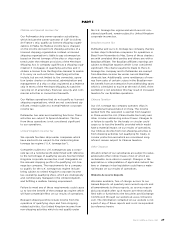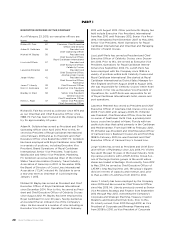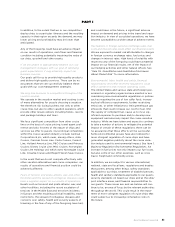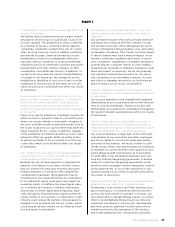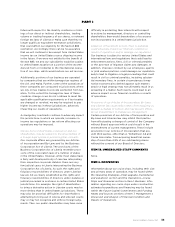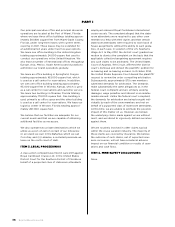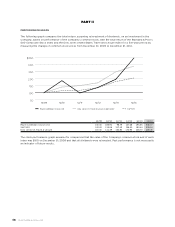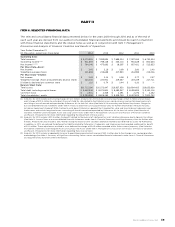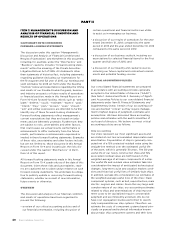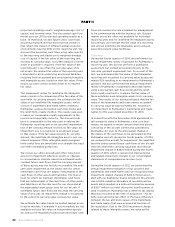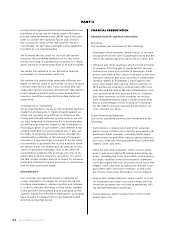Royal Caribbean Cruise Lines 2014 Annual Report Download - page 35
Download and view the complete annual report
Please find page 35 of the 2014 Royal Caribbean Cruise Lines annual report below. You can navigate through the pages in the report by either clicking on the pages listed below, or by using the keyword search tool below to find specific information within the annual report.
34 Royal Caribbean Cruises Ltd.
PART I
that other investors in such ventures could become
bankrupt or otherwise lack the financial resources to
meet their obligations, or could have or develop busi-
ness interests, policies or objectives that are inconsis-
tent with ours. In addition, actions by another investor
may present additional risks of operational difficulties
or reputational or legal concerns. These or other issues
related to our co-investment with third parties could
adversely impact our operations.
We rely on third-party providers of various services
integral to the operations of our businesses. These
third parties may act in ways that could harm our
business.
In order to achieve cost and operational efficiencies,
we outsource to third-party vendors certain services
that are integral to the operations of our global busi-
nesses, such as our onboard concessionaires, certain
of our call center operations and operation of a large
part of our information technology systems. We are
subject to the risk that certain decisions are subject
to the control of our third-party service providers and
that these decisions may adversely affect our activities.
A failure to adequately monitor a third-party service
provider’s compliance with a service level agreement
or regulatory or legal requirements could result in sig-
nificant economic and reputational harm to us. There
is also a risk the confidentiality, privacy and/or secu-
rity of data held by third parties or communicated
over third-party networks or platforms could become
compromised.
A failure to keep pace with developments in technol-
ogy or technological obsolescence could impair our
operations or competitive position.
Our business continues to demand the use of sophis-
ticated technology and systems. These technologies
and systems must be refined, updated, and/or replaced
with more advanced systems in order to continue to
meet our customers’ demands and expectations. If we
are unable to do so in a timely manner or within rea-
sonable cost parameters or if we are unable to appro-
priately and timely train our employees to operate
any of these new systems, our business could suffer.
We also may not achieve the benefits that we antici-
pate from any new technology or system, and a fail-
ure to do so could result in higher than anticipated
costs or could impair our operating results.
We may be exposed to risks and costs associated
with cyber security, including protecting the integrity
and security of our guests’ and employees’ personal
information.
We are subject to various risks associated with the
collection, handling, storage and transmission of
sensitive information, including risks related to com-
pliance with applicable laws and other contractual
obligations, as well as the risk that our systems col-
lecting such information could be compromised. In
the course of doing business, we collect large volumes
of internal and customer data, including personally
identifiable information for various business purposes.
If we fail to comply with the various applicable data
collection and privacy laws, we could be exposed to
fines, penalties, restrictions, litigation or other expenses,
and our business could be adversely impacted.
In addition, even if we are fully compliant with legal
standards and contractual requirements, we still may
not be able to prevent security breaches involving
sensitive data. Any breach, theft, loss, or fraudulent use
of guest, employee or company data could adversely
impact our reputation and brand and our ability to
retain or attract new customers, and expose us to
risks of data loss, business disruption, governmental
investigation, litigation and other liability, any of which
could adversely affect our business. Significant capital
investments and other expenditures could be required
to remedy the problem and prevent future breaches,
including costs associated with additional security
technologies, personnel, experts and credit monitor-
ing services for those whose data has been breached.
Additionally, the techniques and sophistication used
to conduct cyber-attacks and breaches of information
technology systems, as well as the sources and targets
of these attacks, change frequently and are often not
recognized until such attacks are launched or have
been in place for a period of time. Our security mea-
sures cannot provide assurance that we will be suc-
cessful in preventing such breaches.
A change in our tax status under the United States
Internal Revenue Code, or other jurisdictions, may
have adverse effects on our income.
We and a number of our subsidiaries are foreign cor-
porations that derive income from a United States
trade or business and/or from sources within the
United States. Drinker Biddle & Reath LLP, our United
States tax counsel, has delivered to us an opinion,
based on certain representations and assumptions
set forth in it, to the effect that this income, to the
extent derived from or incidental to the international
operation of a ship or ships, is exempt from United
States federal income tax pursuant to Section 883
of the Internal Revenue Code. We believe that most
of our income (including that of our subsidiaries) is
derived from or incidental to the international opera-
tion of a ship or ships.
Our ability to rely on Section 883 could change in
the future. Provisions of the Internal Revenue Code,
including Section 883, are subject to legislative change
at any time. Moreover, changes could occur in the





